#studyposting
Explore tagged Tumblr posts
Text
Universities love to make their websites completely unusable and impossible to find things on it's their favourite activity
#I WAS LOOKING FOR 1 PIECE OF VERY GENERAL INFORMATION WHY DID I HAVE TO GO THROUGH FIVE PAGES TO GET ITTTT#studyposting#jory.txt
9K notes
·
View notes
Text
Best Study Techniques
Blurting: By far, blurting is my favourite way to study. By using this method we could find our knowledge gaps and focus on them.
Quizzing Yourself: Quizzing yourself using flashcards or the app Quizlet could be extremely helpful as you are gamified your studies and make it fun. Your main motive, while using flashcards, should be to recall the information as fast as you could and get it to A 100%.
Feynman Technique: Feynman Technique is basically pretending to teach yourself or a kid in simplest words, which could be used for subjects such as History and Biology to find your knowledge gaps.
Moderate Study Techniques
Highlighting the important text so that you don't have to waste time on unnecessary text.
Re-reading your notes won't be much effective as you will only be reading your text and actually won't be able to digest the content.
#studyblr#education#school#textbooks#student life#study tips#study session#study study study#study.#studyspo#studyspiration#studystudystudy#study space#study aesthetic#study academia#study advice#study studyblr#study studying studygram studyblr studyabroad studyhard studyspo studymotivation studytime studyinspiration studyinspo studyaccount studyblo#studying#study mode#study#study blog#study buddy#studybrl#study time#study techniques#studies#study motivation#studymaterial#studyposting
28 notes
·
View notes
Text
shaking vibrating i have an exam in 4 days i have so much to do aaaaaaaa
#personal#studyposting#also i havent called her today r u proud of me (fighting the temptation is Hard but im trying to have. dignity and grace so)
12 notes
·
View notes
Text
i don't usually post about academic things going on in my life, but this week has meant so much to me.
for reasons i'm still trying to understand, i was allowed to study a language (alongside my original program). long story short, my research is centered on plague history in Ireland. this, of course, is inseparable from the violent colonialism imposed on Ireland, and the reflections of this are so evident everywhere you look. nothing can be said about history as a whole that does not also state something about your values or politics; they are so closely intwined. i also believe that language is such a precious medium of such history - language is the lifeblood of culture. to research and rely on translations means that so much of what you could see is lost, you're stuck in the valley between observation and understanding. i want to understand.
it would also be so hypocritical of me to say this while still relying on solely english to communicate this research, which is why i am so grateful my supervisor has been so supportive. my goal in the end is to produce a semi-bilingual thesis, to hold the space and respect for the evolution of Irish through the age i am studying. there are so many feelings i have about it and hope to share them as i have the words but this is all i have for now :)
23 notes
·
View notes
Text
I was reading through a chronicle of medieval Ireland today and there was a note about how there were multiple editions of this text but they were all “riddled with failures and functionally worthless” so they were obliterated. I want to know what was in them!!! Show me the things scribes were reading and rolling their eyes at!!
i do think theres something sad about how largely only the literature that's considered especially good or important is intentionally preserved. i want to read stuff that ancient people thought sucked enormous balls
98K notes
·
View notes
Text
im supposed to "skim" these sections for reading for my class but there is no way in hell to skim such a dense ass text without missing something, it makes far more sense to just read thoroughly so i dont miss something
1 note
·
View note
Text
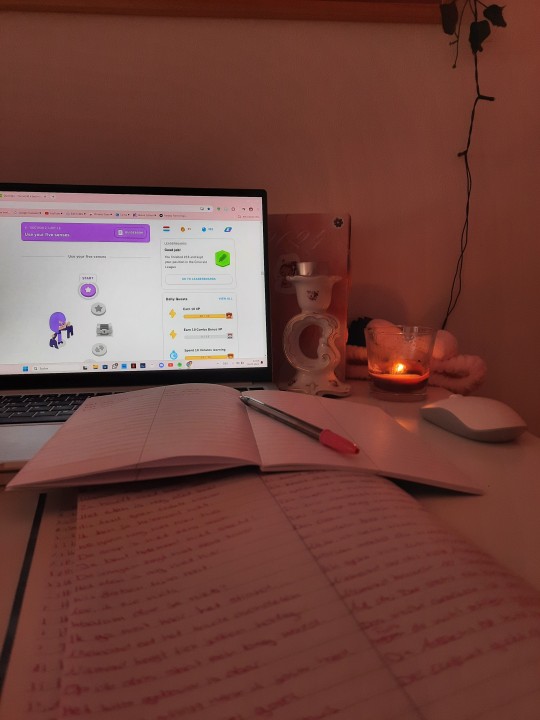
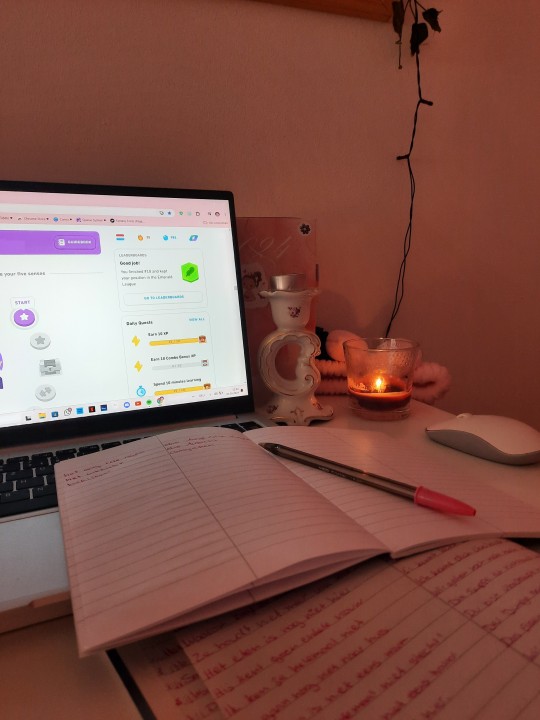
Finally got myself to continue studying dutch today!
(Because I am moving in August, hehe!)
#be kind to yourself. ��#i love you! 🩷🍃#mine#dutch#study motivation#studying#studypost#cozy#candle#cosy
40 notes
·
View notes
Text
Countdown to JEE (Main): Week 2/33
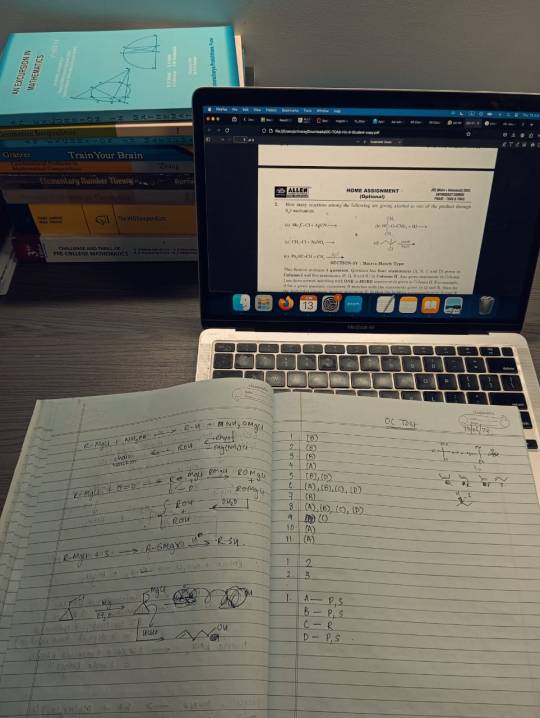

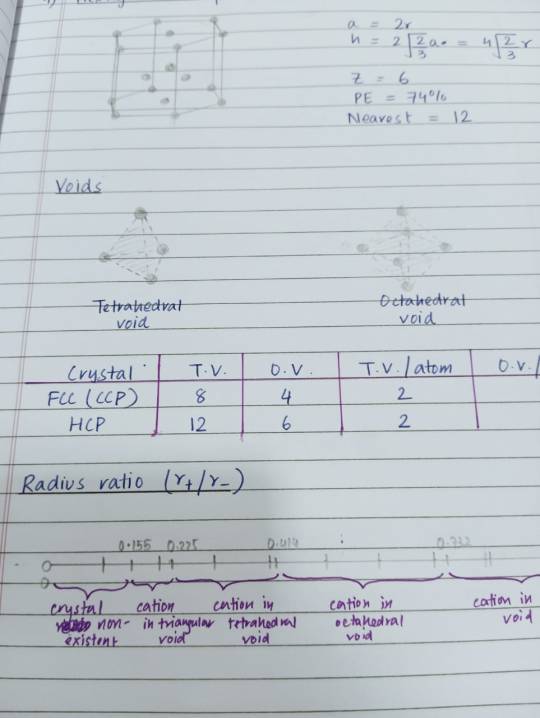
I've done a lot this week! Hit almost all the topics I wanted to. You'll notice that there are some topics I've covered but not solved questions for — these are the ones I studied for the first time and/or made notes for.
Other than that, I have my school unit tests from next Wednesday, so there's that. Sadness.....
Test results:
Test at physics tuition center: 116/120, rank 1/67! Yay!
Aryabhatta National Mathematics Competition: score unknown, result expected on 10/07/2024.
Topics covered:
Physics: Potential and Capacitance; Electromagnetic Waves, Waves on a String; Modern Physics; Gravitation; Electromagnetic Induction (6/3)
Chemistry: Chemical Thermodynamics; Atomic Structure; Chemical Equilibrium; Halogen Derivatives; Solid State (5/3)
Mathematics: Differential Equations; Area Under a Curve; Applications of Derivatives; Determinants; Complex Numbers; Ellipses; Hyperbola; Binomial Theorem; Functions (9/3)
Questions solved:
Physics: - FIITJEE Electrostatics* module, Assignment section — 56 questions, 52 correct - Allen Potential and Capacitance module, O1 and O2 — 88 questions, 77 correct -FIITJEE JEE (Main) archives, Electromagnetic Waves — 12 questions, 10 correct - Allen Waves on a String module, O1 and O2 — 67 questions, 59 correct - FIITJEE JEE (Main) archives, Modern Physics — 40 questions, 34 correct - Allen Gravitation module, O1 and O2 — 61 questions, 55 correct Total: 383/60 questions, 287 correct *FIITJEE includes Potential and Capacitance under Electrostatics, while Allen does not.
Chemistry: - Allen Chemical Thermodynamics module, S1 and S2 — 40 questions, 37 correct - R. N. Sarin, Atomic Structure — 18 questions, 18 correct - R. N. Sarin, Chemical Equilibrium — 11 questions, 11 correct - Allen Halogen Derivatives module, JEE (Advanced) archives — 24 questions, 22 correct Total: 93/60 questions, 88 correct
Mathematics: - Allen Differential Equations module, O1 — 30 questions, 25 correct - Allen Area Under a Curve module, Do Yourself 1, 2, 3, 4, 5 and O2 — 51 questions, 46 correct - FIITJEE JEE (Main) archives, Applications of Derivatives — 45 questions, 39 correct - FIITJEE JEE (Main) archives, Determinants — 22 questions, 17 correct - Yellow Book, Complex Numbers, single-choice questions — 20 questions, 17 correct - Pink Book, Ellipses, single-choice questions — 16 questions, 14 correct - Yellow Book, Binomial Theorem, single-choice questions — 15 questions, 12 correct - Pink Book, Hyperbolas, single-choice questions — 21 questions, 18 correct - Allen Functions module, O1 and JEE (Main) archives — 48 questions, 44 correct Total: 268/60 questions, 232 correct
GRAND TOTAL: 744/400 questions, 607 correct
Upcoming tests:
23/06/2024 (next Sunday) — Allen monthly test. Topics: Kinetic Theory of Gases; Physical Thermodynamics; Electrostatics; Potential and Capacitance; Current Electricity; Electromagnetic Induction; Alternating Current; Electromagnetic Waves; Waves on a String; Sound Waves; Ray Optics; Wave Optics; Circle; Functions; Differentiation; Applications of Derivatives; Indefinite Integrals; Definite Integrals; Area Under a Curve; Differential Equations; Matrices; Silicates; Molecules That Do Not Exist; Coordination Chemistry; Metallurgy; Electronic Displacement Effects; Halogen Derivatives; Atomic Structure; Chemical Equilibrium; Solid State; Solutions; Chemical Kinetics; Chemical Thermodynamics. Yeah. I've no idea how I'm going to finish the syllabus in time, since I haven't even started Coordination Chemistry, Metallurgy or Alternating Current — they finished the classes in Allen before I even joined the batch. Anyway, let's see.
That'll be all till next week — see you again!
#studyblr#desi studyblr#study blog#jee 2025#joint entrance examination#jee mains#jee advanced#weekly studyposting#porashona
26 notes
·
View notes
Text
Every time there's a serious winter storm my professors are like we will NOT be cancelling class you had better have yourself here at the normal time tomorrow or we'll skin you alive in front of everyone AND WE MEAN THAT and then the next morning after everyone's already woken up early and put on the franklin expedition fit to go outside and attend their stupid ass class they're in my email inbox like. hi. ok this is awkward but
46 notes
·
View notes
Note
hi cianna! i have just begun studying for the lsat (thank u for the study advice earlier!) and i'm wondering if you have recommendations for study related blogs on tumblr? i go into the tags and it seems to be like 99% moodboards aesthetic stuff, which is nice enough, but not really what i'm looking for
Hi my angel <3 honestly I do NOT like I literally know no one else who posts about their obsession for studying as much as I do. It’s why I’ve decided to be my own studyposting blog lol. I just hype myself up w my posts & it has been working for me. If I find any studyblrs like the ones u’d like, I’ll be sure to send them ur way
#I think the specific studyblr ur looking for……. is me#I wouldn’t say I’m mainly a studyblr (bc I’m not) but I post a lot ab it#And will probably continue to#This bitch is going to med school so studyposting is not slowing down anytime soon
9 notes
·
View notes
Text

This post is for all Russian language learners: I am a native Russian speaker and I will be happy to help you. I can chat with you, correct your mistakes and compose simple texts for reading. Feel free to write to me :)
16 notes
·
View notes
Text
feeling physically ill when i try to do the barest minimum amount of studying is kind of not what i was expecting of myself today
#not 2 be dramatic but what the fuck is wrong with me#im off vacation and finals are nearso its frantic studyposting again sorry#txt
5 notes
·
View notes
Text
How-To Presentation
Imagine this: It's the first year of university. You, a bright-eyed and bushy tailed freshman, riding on the high of having declared your major and successfully defending it in the face of well-meaning relatives ("Oh, I did Archaeology for a few semesters when I was at uni, before I came to my senses. Are you sure you don't want to be a business major? Or maybe pre-law, you were always so good at arguing - ") have just sat down in your very first seminar. The professor walks in, spends an hour going over the syllabus, and then announces that to pass the class, everyone will have to hold a 30 min presentation on a pre-determined topic. You can feel your stomach sinking somewhere below your knees. A cold chill grips you. You hate public speaking and the longest you've ever had to talk in front of the class in high school was 10 minutes. What do you do now??!
Well, you click on the read more.
Step 1: Don't panic. Let's get an overview of your topic and make a plan.
WHEN TO DO THIS: Same week as you got your presentation topic
First things first, as soon as you get your presentation topic and your deadline, even if that deadline is 8 weeks from now, IMMEDIATELY hop on your computer and get yourself some literature. There are some topics that are so well-researched and well-published you can walk into any library and immediately find 12 sources, and then there are topics that you have to special order books that went out of print in 1945 for. You do not know what kind of topic your topic is until you go to the library, and special ordering books takes time, sometimes A LOT of time. FINDING these books also takes a lot of time. So always make sure you HAVE the time to do this! A good starting point to have ist 2-5 books (depending on availability) with your presentation topic directly in the title.
If you have absolutely no idea whatsoever what your topic even IS, go to Wikipedia. DO NOT use Wikipedia as a source. You're going to read the article, find out what your topic is about, and then go to the list of sources at the bottom and get THOSE from the library. If you can't find anything other than those, or if your topic doesn't HAVE a Wikipedia article, go see your professor during their office hours. Do this NOW, not two weeks before the presentation. If your professor is sick, write them an e-mail NOW and go ask your TA. You need to make sure they can see you did your best to find stuff early on - if something goes wrong, profs are a lot more likely to give you extra credit or be extra nice with your grade if you have a paper trail proving you tried to resolve any issues you had early on. They won't be able to help you anymore two days before the presentation.
As soon as you have your 2-5 books, you sit down and just flip through them. Skim whatever catches your eye, look at pictures and graphs, read the table of contents. This is going to give you an idea on how much you actually have to stress about your research. Are all your books really old and super thin? Bad sign. Did you immediately find tons of books published in the last 10 years and those bitches THICC? You can probably relax a little. Then, as you're skimming, you're going to form a very rough idea what your topic is about. Things to look out for are:
How complex is your topic? The broader and less specific, the more research you're likely to have to do (example: If your topic is "The late middle ages", good luck. If your topic is "Burg Eltz during the late middle ages" you're going to have it a lot easier.)
What time period are you in? Always know your backround!
What is the state of research? Look out for things that should be there but aren't!
Is there some kind of controversy going on? Do some sources contradict each other?
Now you know a little bit about your topic, and can plan for the following things:
How many more sources are you going to need?
How long until you have those sources in your actual hands or on your actual computer?
How much research are you going to have to put into this?
Step 2: Initial research and structure
WHEN TO DO THIS: Within the week you got your hands on your sources.
If you've completed Step 1, your should have an initial list of sources. Pick the most general of those babies, turn to a relevant chapter, and get excerpting.
Q: How do I find the most general source?
A: The most general source is the one that goes into least detail while giving the broadest range of information. A good place to start are dictionary entries (make sure you're using a dictionary relevant to you subject, not the Encyclopedia Britannica...) or books with something like "introduction to..." or "overview of..." in the title. When in doubt, look at the table of contents!
If you're presenting to something very Basic™ at the beginning of your university career, your professor or TA will most likely have provided you with a list of "basic literature" for your course or subject. Look to these. If your topic is more complex, a good way to determine if a source is what you're looking for is reading the introduction chapter of your book and seeing if you recognise things you need.
Q: How do I indentify a relevant chapter?
A: Use your logic. If your presentation topic is late medieval castles, and your book covers castles of all time periods, you don't need the chapters talking about early- and high medieval castles, or post-medieval fortresses. DO NOT read the whole book. Skip everything you don't need. If you're reading a relevant chapter and the author starts talking about things you don't need to know, flip ahead until they do.
Q: What is excerpting?
A: This.
Image description in alt text.
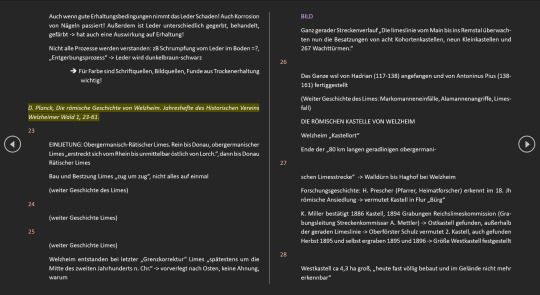
You're going to write down the title of your source and you're immediately going to write that down in the citation style it has to be in for your presentation. Highlight it to make it easier to find later. Then you're going to write down all relevant information and the page number you found it on, and everything you're too lazy to summarize in your own words you're going to copy down directly in quotation marks. The quotation marks are important - you need to know when to say you're quoting someone directly in your presentation. I know this looks like a fuck ton of work, and it is. But it's going to do these things for you that make it absolutely worth it:
You're going to remember A LOT more of the information
You're going to be able to bring the book back to the library on time (pro tip: Also immediately scan relevant pictures)
You're going to be able to just copy-paste the already correctly cited title into your list of sources
When you're writing your presentation notes you're not going to have to flip through the whole book in search of the one bit of information you vaguely remember. You can just print out your document, highlight what you need, and have it there in one look.
In my experience, doing excerpts saves you about three to five days of work, spares you an unholy amount of frustration, and makes it A LOT easier to not accidentally plagiarize because you wrote down something and forgot it was a word-for-word quote.
As soon as you worked through your general source(s), you can structure your presentation. For Archaeology presentations, there is a general formula you can usually follow that looks roughly like this:
1. Introduction
2. Main Part: Your Topic Goes Here
2.1 History of research for your topic
2.2 General information: What time is your topic in, what are important monuments or finds, what is your topic exactly
2.3 All the information you have if your topic is very narrow (a certain type of pot, a single monument, whatever) or one or more examples if your topic is very broad (a prehistoric culture, a type of wide-spread monument, a time period)
3. Conclusion. This is the place to either summarize, bring in your own opinion, or go into detail about a controversy surrounding your topic
Find out how you want to structure your presentation (maybe this isn't the way to do it! Adjust to your topic!) and what examples you want to show. If this part is giving you trouble, e-mail your TA or your professor or visit them during office hourse. Again, do this IN TIME. The earlier, the better, AT LEAST two weeks before your presentation, better WAY before that.
If you find you need to special order sources from your library, now is the time to do that. If you're smart, you might want to make a list of all sources you can find that could be relevant to your topic while you're at it.
Step 3: The whole body of research
WHEN TO DO THIS: Depends on the length of your presentation and the complexity of your research. A minimum of 2 weeks before you have to present for a 25-30 min presentation. The busier your schedule, the more sources you have, and the longer your presentation should be, the earlier.
So, now that you know how you're going to structure your presentation, you know what you need to research and what to leave out. Go through your initial list of sources and determine if they are still relevant, now that you know what you're looking for. Identify what informations that you want to put in your presentation are missing from your sources, and find sources that are about them. If you were really smart you already did this after you structured your presentation and now just have to pick books out of a list.
As soon as you have your sources, work through them by excerpting just like you did with your overview literature. Do this from most to least relevant source, in case you misjudged your speed and have to leave out a source. Make sure to always note your page number and immediately copy out relevant graphics!
Step 4: Your presentation slides
WHEN TO DO THIS: The week before your presentation. If you don't want to spend a whole day on this start around 5-4 days before your deadline at the latest and do a few slides at a time.
If your prof gave you a guide for PowerPoint presentations - find that. Use that. Copy the structure of your presentation that you made in Step 2, add your pictures that you already copied out into your excerpting document, and cite them according to the style your professor wants them to be in. If you already did this in your excerpting document like I told you to, this should just be a matter of copy and paste. Don't forget to add your list of sources at the end!
This is also the step where we start thinking about time. A good rule of thumb is that you should have one slide in your presentation for every two minutes of talking. I like to add a few more, because I also always have a title slide, a structure slide, and a list of sources slide, and I don't spend 2 minutes on "Hello everybody, my topic is [x]!".
As soon as you have your slides in about the number you think you need, talk through your presentation OUT LOUD and time yourself. Just say what you remember. If you're more than 5 minutes under target, you need one more slide for every two minutes you're under. If you're more than 2-3 minutes over target, consider what information is actually important to your topic, and try again, leaving everything out everything not relevant, until you land within 2-3 minutes of your target time.
Step 5: Presentation notes and practicing
WHEN TO DO THIS: The day before your presentation at the latest, better 2-3 days before. Your brain is better at memorizing things if you're not stressed out of your mind!
Now that you're reasonably sure you're on your target, time wise, it's time to make your presentation notes. This is a matter of personal style, and you've got to figure out what works best for you. For me, I need a lot of visual cues, so I usually print out my presentations (or sketch the slides if my printer is acting up again) and add the information next to the slide it's on. I also like to add cues like "show structure x" in a different colour to remind myself to engage with my audience, like so:
Image description in alt text of first image.
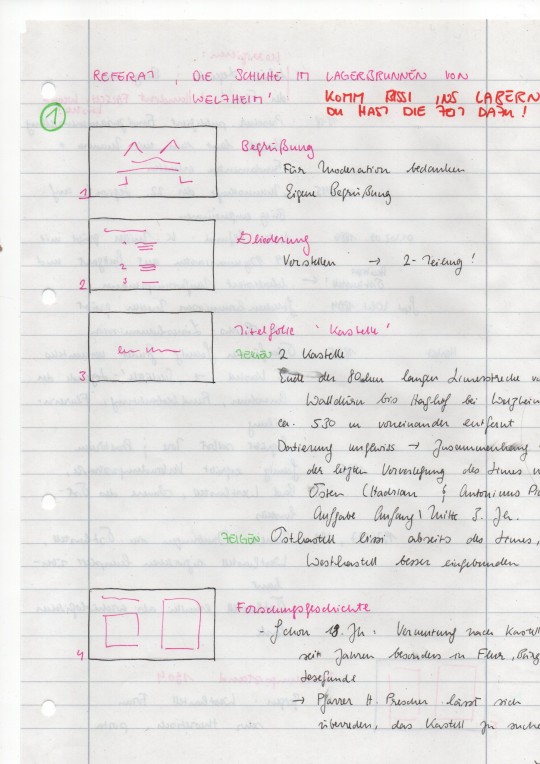
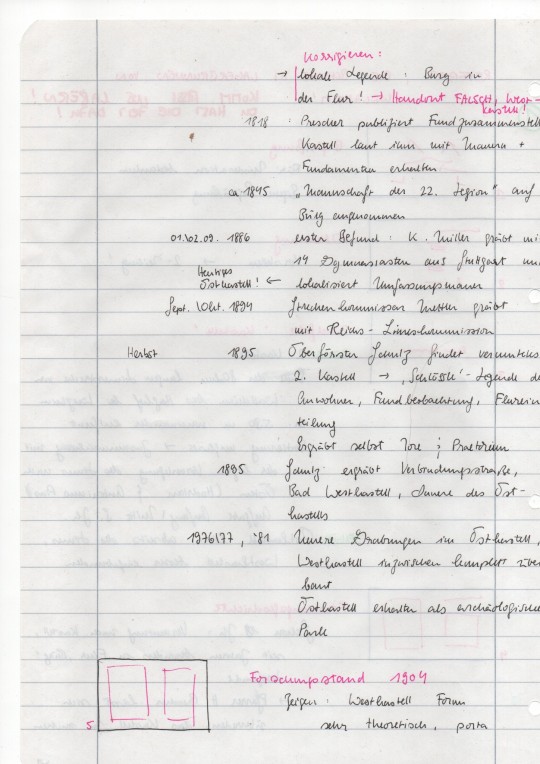
But maybe this doesn't work for you! Maybe you like to write out your whole presentation word-for-word. Maybe you like note cards. Maybe you like to use the presentation mode on PowerPoint to add your notes directly into the document. It doesn't matter what you do, as long as it makes you feel safe presenting and you can reliably remember all your information.
Whatever method you use, make sure to write down all your information. In Step 4 we talked through what we remembered from our research. Now is the time to grab our excerpt documents and make sure all our information is factually correct and that you didn't leave out anything. This will usually add around 5 minutes to your speaking time.
When you have your presentation notes, you're gonna practice your presentation a few times. This is, again, a matter of personal style. Some people just need to read through it once, and they've got it down pat. If you're inexperienced in giving presentations, I recommend talking through your whole PowerPoint using your notes at least one or two times. If you want, you can use a mirror to also practice gestures, or memorize the whole text. No matter what you do, the goal is to automate a little bit. Your body remembers things it's practiced. If you talk through your presentation a few times, it'll be much easier to manage presentation anxiety, because you likely won't have a blackout in front of the class - you'll just go into autopilot and say exactly what you practiced.
Another important aspect of this step is, again, time. This is the time to really fine tune your landing. If you know you tend to talk a lot faster in front of an audience, practice so that you're 2-5 min over your target time. If you know you tend to talk a lot slower, pick a point about halfway through your presentation and memorize what minute you're supposed to be at when you reach it. Look at the clock occasionally during your presentation. If you reach your marker and it's later than its supposed to be, speed up. You can also practice talking faster.
And now all there is to do is present! Good luck - not that you need it, with your excellent preparation!
6 notes
·
View notes
Text
Mastering the Art of Visual Communication: Creating Impactful Project Posters
PosterDesign: Key Questions Explained
1. What is a project poster?
A project poster is a visual presentation that summarizes the key components of a project, including objectives, methods, results, and conclusions. It typically includes graphics, charts, and text to convey information clearly and attractively, making it suitable for academic conferences, workshops, or exhibitions to communicate findings and engage an audience effectively.
2. What is a study poster?
A study poster is a visual presentation summarizing research findings, typically displayed at conferences or academic events. It includes key elements like the study's title, objectives, methods, results, and conclusions, often accompanied by charts, graphs, and images. Posters facilitate discussions and allow researchers to share their work with others in a concise, engaging format.
3. Can a poster have words?
Yes, a poster can have words. In fact, words are often included to convey a message, provide information, or enhance the visual appeal of the design. Text can be used for titles, slogans, or descriptions, making the poster more effective in communicating its purpose to the audience.
4. What is a poster in PhD?
A poster in a PhD context is a visual presentation summarizing research findings, typically displayed at academic conferences. It includes key information like the research question, methodology, results, and conclusions, often accompanied by graphics or charts. Posters facilitate discussions and networking among researchers and help communicate complex ideas in a concise and engaging format.
5. What is poster in school?
A poster in school is a visual display used to convey information, ideas, or messages. It can be created for various subjects or projects and often includes text, images, and graphics. Posters are commonly used for presentations, announcements, educational purposes, or to promote events. They help engage students and make learning more interactive and visually appealing.

Visit: VS Website See: VS Portfolio
0 notes
Text
do you guys ever scroll for a bit on your dash and pat yourself on the back for cultivating the most fire feed ever. i got all my fandoms covered, beautiful artwork, inspiring studyposting, and brainrotting shitposts
2 notes
·
View notes


